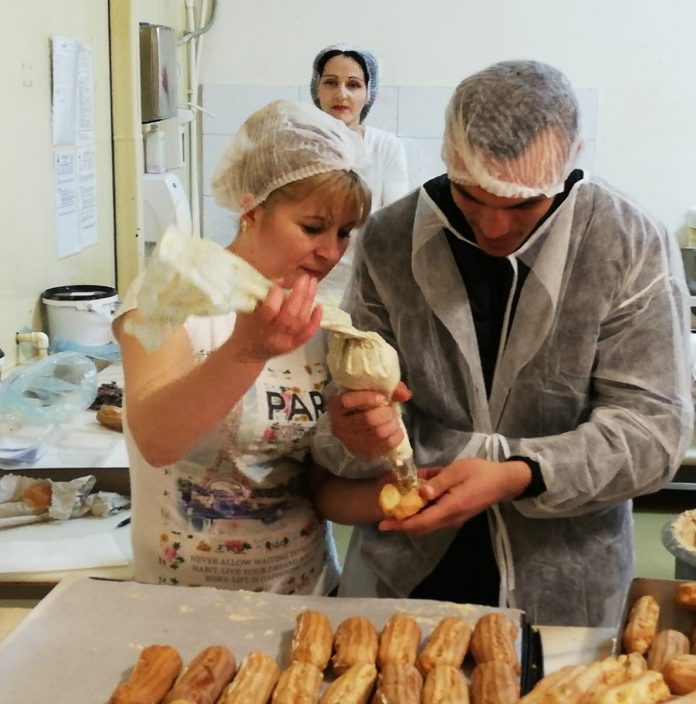The success of hiring a young adult with a disability is linked to providing the right support in the right environment, and effective support in and outside of the workplace is a key element of the supported employment process, which differentiates it from traditional placement services.
Providing support at workplace means more than the direct training of the young adult with disabilities in office / production conditions. The Supported Employment specialist provides assistance not only to the young adult with disabilities, but also to the members of the team in which the young adult is trying to integrate, so that they know how to behave with the new colleague and can train and assist them, as far as possible.
Providing support at workplace means more than just visits made by the Supported Employment specialist to the workplace. It means informative, methodological and emotional feedback. Some employees need more support in order to learn a new task at work, so they prefer regular visits of the Supoorted Employment specialist. At the same time, others, with a high qualification, may have difficulties in taking on the new professional role or problems with colleagues, so they require the presence of the specialist outside the workplace.
The volume of support required is higher at the beginning, decreasing systematically along the way, but both the employee and the employer have access to continuous assistance whenever they need it, because it is proven that this is one of the factors that determine the success of the Supported Employment process.
For example, the young Marius, which studies gastronomy / cuisine at the School Center for Inclusive Education “Albatros” from Constanta, is one of the beneficiaries of the LEAD project employed by Dobre si Fiii, a company specializing in the manufacture of milling, bakery, pastry and confectionery.
Our Supported Employment specialist provided the employer with the needed information regarding the young adult’s skills and agreed with the manager that in the first work month the new employee should be assigned tasks taking into account the skills and knowledge he had at that time.
In the first week of employment, our colleague, Alina, visited him at work every day in order to ensure that Marius will learn correctly and quickly what he has to do. In the second week, she assisted him in 3 of the 5 workdays, and in the next two weeks, she visited him once a week. With Alina’s help, Marius learned to separate correctly and easily the egg yolks from the egg whites, and together with Alina and a co-worker he learned how to use correctly the confectioner’s bag and how to fill the éclairs with cream.
Alina discussed with the young man at each working visit in order to identify the problems he faces in acquiring new knowledge, but also in the relationship with new colleagues, she advised him how to proceed to overcome the moments of fatigue in the first week of work and how to behave with team members. Alina also talked to the staff of the School Center for Inclusive Education in order to be supported on all levels. It should be noted that due to the fact that the employer relieved experienced employees of routine tasks which took up too much time, the productivity of the department increased.
Another example is that of Valentin, a young adult with mild mental retardation, who graduated a post-secondary school specializing in massage. Although he wanted to become a masseur, following the process of vocational counseling, he accepted the idea of a new career direction and was employed in the kitchen at the pizzeria San Marco, a company where other young adults from the School Center for Inclusive Education “Albatros”, beneficiaries of the LEAD project, work.
Because Valentin was hired during the pandemic, when the access in the kitchen was allowed only for employees, our colleague, Olivia, monitored him by phone. In the first week, the employer designated a team member who showed him step by step what to do. Valentin learned very quickly, right from day one, how to do his job, which was to prepare vegetables and mozzarella for slicing. Olivia kept in touch with both Valentin and the employer, in order to prevent any problems related to the young adult’s integration into the team.
As it can be seen, each work situation is different and imposes different requirements on the employee in terms of work characteristics and social skills. Moreover, the volume of support in the workplace varies from company to company. At the same time, the support in the workplace addresses the needs both of the employee and the employer, which can sometimes lead to conflicting objectives. A balanced solution is to recognize the needs of the company, providing the necessary guidance on adaptations and changes, which facilitates the professional integration of young adults with disabilities.


